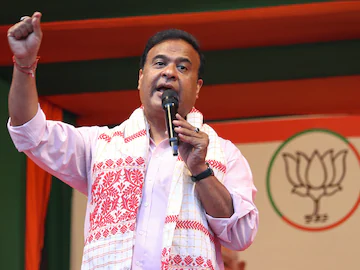The Bharatiya Janata Party (BJP) faced a significant setback in Jharkhand, a loss that has drawn sharp reactions from party leaders across the country. Among the many voices, Assam Chief Minister Himanta Biswa Sarma has been particularly vocal, terming the defeat as “deeply painful.” His comments shed light on the BJP’s challenges and its aspirations for a stronger foothold in eastern India, where political dynamics remain fluid and intensely competitive.
A Painful Loss for the BJP
The BJP’s loss in the recently concluded bypolls in Jharkhand has come as a jolt to the party, which has been striving to consolidate its position in the state. The Dumri by-election, where the Jharkhand Mukti Morcha (JMM) emerged victorious, marked a critical moment. The seat was previously held by the BJP’s ally, the All Jharkhand Students’ Union (AJSU). The ruling coalition’s win has not only fortified the position of Chief Minister Hemant Soren but also exposed fissures in the BJP’s electoral strategy in the state.
Himanta Biswa Sarma, a key strategist and prominent leader of the BJP in the northeast, expressed his disappointment at the loss, emphasizing the party’s need for introspection. “Jharkhand is an important state for us, and every setback there is deeply painful for me personally,” he remarked during a press interaction. Sarma, who has been instrumental in bolstering the BJP’s presence in the northeast, understands the importance of strong regional strategies, a lesson the party may need to revisit in Jharkhand.
The Political Landscape of Jharkhand
Jharkhand’s political arena is marked by a strong presence of regional parties like the JMM and the AJSU, which resonate deeply with the state’s tribal and rural populace. While the BJP has enjoyed significant support in the past, particularly during the tenure of former Chief Minister Raghubar Das, the party has faced challenges in bridging the gap with local communities.
The Dumri bypoll results reflect the ruling coalition’s ability to mobilize a diverse voter base, including tribal and backward communities, to counter the BJP. Hemant Soren’s leadership has played a pivotal role in consolidating anti-BJP sentiments, leveraging the government’s welfare schemes and promises of tribal empowerment.
Himanta Biswa Sarma’s Concerns
As someone deeply involved in expanding the BJP’s influence in states with challenging political dynamics, Sarma’s reaction to the Jharkhand loss holds weight. “We need to identify where we went wrong, whether in candidate selection, campaigning, or understanding the aspirations of the people,” he stated. His words echo the sentiments of many within the BJP, who believe that the party must recalibrate its approach to regional politics.
Sarma also highlighted the broader implications of the loss. Jharkhand’s proximity to the BJP-ruled states of Uttar Pradesh and Bihar makes it a strategically important region. A strong presence in the state could bolster the party’s standing in eastern India, a region where the BJP faces stiff competition from regional powerhouses like the Trinamool Congress in West Bengal and the Rashtriya Janata Dal in Bihar.
The Road Ahead for the BJP
The Dumri defeat serves as a wake-up call for the BJP, which must address several critical issues if it hopes to reclaim its influence in Jharkhand. Firstly, the party needs to strengthen its connection with tribal communities, who form a significant portion of the state’s electorate. Building alliances with smaller, local parties and focusing on grassroots campaigning could also help the BJP regain lost ground.
Secondly, the BJP must present a cohesive vision for Jharkhand, addressing issues like unemployment, rural development, and education. While the party has often relied on its national leadership and Modi’s charisma, regional leaders must be empowered to take the reins and address local issues directly.
Himanta Biswa Sarma’s candid acknowledgment of the pain caused by the BJP’s loss in Jharkhand reflects the party’s recognition of its shortcomings in the state. While setbacks are an inevitable part of politics, they also provide an opportunity for introspection and growth. For the BJP, Jharkhand represents both a challenge and a chance to refine its approach to regional politics.
As the 2024 general elections approach, the BJP will need to reassess its strategies not just in Jharkhand but across the eastern region. Leaders like Sarma, with their focus on grassroots engagement and regional dynamics, will play a crucial role in shaping the party’s path forward. Whether the BJP can overcome these obstacles and reclaim its position in Jharkhand remains to be seen, but the loss has undoubtedly served as a reminder of the complexities of Indian politics.


